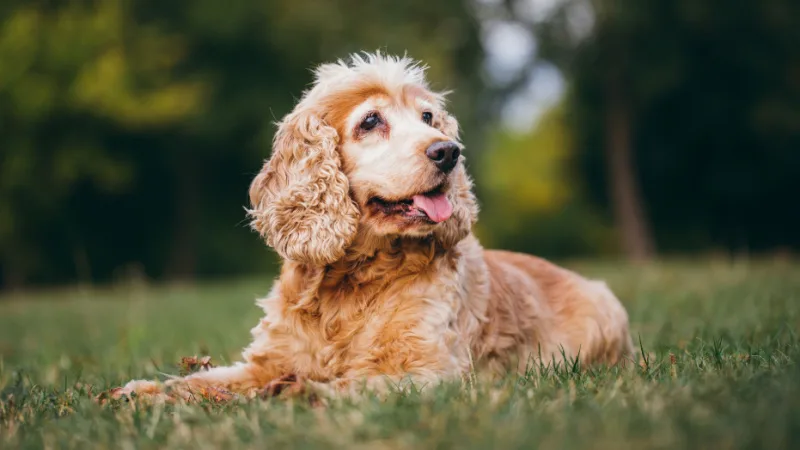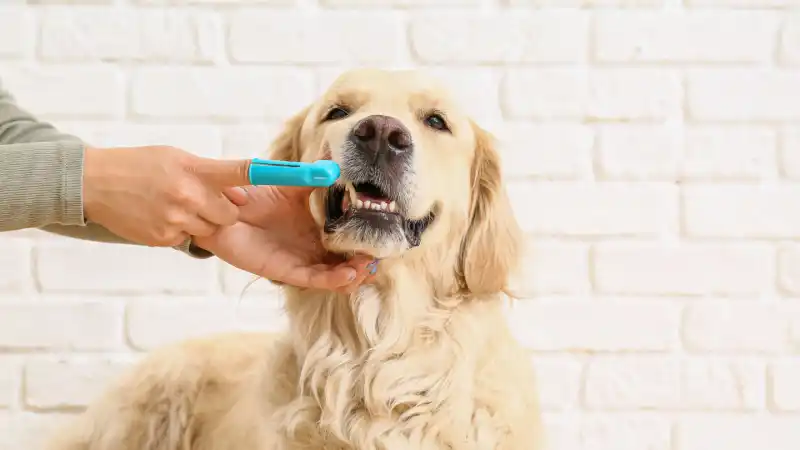Obesity in Senior Dogs
Extra weight isn't a normal part of getting older for dogs. Here are 4 ways to fight obesity in senior dogs, including age-appropriate diet and exercise.

It’s OK for your senior dog to carry a little bit of extra weight, right? No, not really. That “little bit” of extra weight can go a long way when it comes to exacerbating health conditions such as arthritis, kidney disease, cardiac disease, respiratory issues, and diabetes. Multiple studies have shown that maintaining a healthy weight and preventing obesity can contribute not only to quality of life, but also to life span. This is especially important for our senior dogs who have less time left to spend with us.
The Impact of Obesity on Senior Dogs
The latest data indicates over 50% of dogs living in the United States are overweight or obese. It seems that the obesity epidemic is not just a human problem! Obesity can lead to and worsen multiple health problems, but the number one reason to avoid extra weight in senior animals is to reduce the painful effects of arthritis.
Osteoarthritis or degenerative joint disease (DJD) unfortunately develop in the joints as part of the normal aging process. However, by keeping your dog at an appropriate weight, you can help prevent the onset of arthritis and lessen the impact on your dog’s mobility and comfort.
How to Ensure Your Senior Dog Is at a Proper Weight
Feed your senior dog the appropriate amount of food daily: The guidelines on pet food packaging are just guidelines. The recommended amount by the food company does not consider your pet’s unique metabolism or their reduced activity if they are a senior. You can easily determine your pet’s caloric needs with this online calculator. Once you’ve calculated the calories per day that your dog needs, compare it with the packaging by looking for kcal/cup or kcal/oz. Feed only what your dog needs or even a little less if you plan to offer treats throughout the day. Treats should be about 10% of your dog’s daily calorie intake.
Assess your pet’s body condition score regularly: Body condition scores help veterinarians and pet parents determine whether their pet is in an ideal “condition” rather than weight. These are useful because every dog is unique and may carry their weight (or extra weight) differently. The body condition method also helps if weighing your pet regularly is not convenient. You can use this chart to determine if your dog is underweight, ideal, or overweight. Veterinarians use body condition scores to evaluate your dog during appointments, so you’ll be able to speak the same language when it comes to your pet’s weight. If you find that your dog is underweight or overweight according to the body condition score, it’s time to talk with your vet about what to do next.
Provide appropriate daily exercise for your senior dog: Exercise is important for all life stages, but especially for senior dogs. Senior dogs may “slow down” due to their age, energy level, and arthritis. But we don’t want our senior dogs to stop being active! Movement helps to lubricate the joints, which in turn prevents arthritis. Plus, exercise is one of the best ways to prevent obesity and weight gain. If you live in a harsh or hot climate, you may need to get creative with options for indoor exercise. If you have a senior dog who has already been diagnosed with arthritis or other health conditions, you need to have a conversation with your veterinarian about what level of exercise is appropriate for them.
Feed real food or foods high in moisture: Dry kibble food is convenient. It’s also a very highly processed form of dog food with high caloric density. For example, the average cup of dry dog food is around 350 kcal/cup, while the average cup of moist food (canned or other options) is around 200 kcal/cup. You don’t have to give up kibble for your dog completely, but feeding a combination diet that includes a portion of high moisture foods (canned, gently cooked, home cooked, or raw) can help to keep excess weight off, improve hydration, and add to the variety of nutrients that your senior dog receives. It's best to talk with your veterinarian about diet changes. However, not every vet will be willing to discuss foods other than kibble. If combination feeding interests you, you may need to seek out an integrative veterinarian or one that has a special interest in nutrition.
When it comes to excess weight, the stakes (not steaks!) are high for senior dogs. That little bit of extra weight can really impact how they move and their comfort level, especially in senior dogs with arthritis. Obesity can also add to other health risks. So, do your senior dog a favor by paying attention and doing your best to keep them in an ideal body condition. This way, you’ll keep them around for a longer, happier life!
Take some of the stress out of senior pet ownership with Accident & Illness Coverage through AKC Pet Insurance (underwritten by Independence American Insurance Company). Our pet insurance plans are designed to provide assistance to pets of all ages, allowing you to focus more on the health of your pet and less on costly veterinary bills. Click here for a quote today!
Nell Ostermeier is an Integrative Veterinarian, Motivator, Lecturer, and Consultant.
READ MORE ARTICLES

